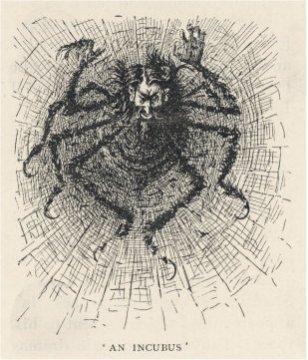 Du Maurier is interesting as a possible influence on Burroughs. Du
Maurier not only borrows from authors he admires but tells the reader he's
borrowing. Burroughs borrows without creditation. The great
literature of the nineteenth century was written during Du Maurierís lifetime.
Thus Alexandre Dumas' Three Musketeers of 1845 was a new book.
It was also a book that overwhelmed Du Maurier's imagination,while having
a later profound effect on Burroughs. Thus Du Maurier tells the reader
his plot is based on The Three Musketeers. Like Burroughs
Du Maurier incorporates several sources in an obvious manner. He
was apparently fascinated by Henry Murgerís Scenes De La Vie Boheme of
1851. I havenít read the book as yet but other reviewers say the
influence is there. I pick up an influence from La Dame Aux Camellias
by Dumas fils also. Du Maurier refers to many poets and writers whose
writing left him helpless but as I am not that well grounded in many aspects
of early nineteenth century literature I canít identify the influences
myself but they are as plentiful and obvious as with Burroughs himself.
Du Maurier is interesting as a possible influence on Burroughs. Du
Maurier not only borrows from authors he admires but tells the reader he's
borrowing. Burroughs borrows without creditation. The great
literature of the nineteenth century was written during Du Maurierís lifetime.
Thus Alexandre Dumas' Three Musketeers of 1845 was a new book.
It was also a book that overwhelmed Du Maurier's imagination,while having
a later profound effect on Burroughs. Thus Du Maurier tells the reader
his plot is based on The Three Musketeers. Like Burroughs
Du Maurier incorporates several sources in an obvious manner. He
was apparently fascinated by Henry Murgerís Scenes De La Vie Boheme of
1851. I havenít read the book as yet but other reviewers say the
influence is there. I pick up an influence from La Dame Aux Camellias
by Dumas fils also. Du Maurier refers to many poets and writers whose
writing left him helpless but as I am not that well grounded in many aspects
of early nineteenth century literature I canít identify the influences
myself but they are as plentiful and obvious as with Burroughs himself.
In his own life
Du Maurier had aspirations to be an opera singer but lacked the powerful
voice. He then aspired to be an artist but lacked that talent becoming
one of the premier illustrators of the century instead. And then
as he felt death approaching he turned to writing. Thus a failure
as a singer, a failure as an artist but success as an illustrator he became
a huge success as a novelist. The careers of his protagonists generally
follow the same course.
He is also a nostalgic
writer as he lovingly recreates the scenes of his youth and life.
He always retained the impress of La Boheme living his life in a genteel
bohemian style. I suppose today he would be like an old hippy walking
around in a gray pony tail, sandals and the garb of the sixties while making
a fortune as a stock broker.
Thus Trilby opens
in an artistís atelier on the Left Bank of Paris in the Latin Quarter.
The Latin Quarter of his time may be compared to New Yorkís Greenwich Village
or San Franciscoís North Beach of the fifties and sixties. Du Maurier
himself lived such an existence for a couple years at the end of the eighteen
fifties.
We are thus introduced
to his three musketeers- Taffy, the Laird and Little Billee. They
are fine comrades living the Bohemian life style much as some upper middle
class hippies took to a bohemian life style with torn jeans and the pose
of the impoverished in the nineteen-sixties.
The whole ensemble
is gathered thogether in the atelier for the opening section. Taffy,
The Laird and Billy are letting the studio. As Du Maurier says on
the title page this is a love story. Trilby Oí Farrell the love interest
turns up immediately. She and Billy love each other but Trilby is
classed as a grisette which was apparently the equivalent of a hippy chick
who was somewhat free living. Trilby declassed herself completely
by posing as an artistís model in the altogether or, in another word, nude.
This was no small thing to all concerned although the bohos tended to be
a little tolerant.
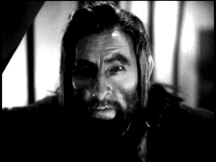 After Trilby arrives come Svengali and his sidekick Gecko. They are
musicians. Svengali is billed as an incomparable musician which is
to say performer. He was a great pianist. He taught Gecko his
violinist everything he knew.
After Trilby arrives come Svengali and his sidekick Gecko. They are
musicians. Svengali is billed as an incomparable musician which is
to say performer. He was a great pianist. He taught Gecko his
violinist everything he knew.
We are discussing
the nineteenth century and nineteenth century views in context. The
story canít be told any other way. If the attitudes and opinions
of other times and other people offend y0u be forewarned and proceed at
you own risk. I will bowlderize history to suit no oneís whims.
As Walter Duranty facetiously said: I write as I please. Du
Maurier, the gentlest of men, nevertheless had well formed opinions.
Svengali is a Jew and pretty much a stereotype of the Jew at the time.
He appears to be a beteljew from the Pale actually although he is said
to be German but the accent Du Maurier gives him could just as well be
Yiddish as German. It is important to bear all this in mind because
in the contest for the possession of Trilby between Billy and Svengali
the latter is going to obtain her.
Thereís an interesting
contrast here the meaning of which isnít exactly clear to me. Trilby
has a beautiful foot, the kind that drives fetichists wild. After
this first encounter Billy, the consummate artist, sketches the foot on
the wall to perfection. All the others are amazed at the likeness.
This sketch occupies as central place in the story as does Svengaliís hypnotism
of Trilby. Svengali on the other hand demands that Trilby open her
mouth wide so he can look in. Raises your eyebrows when you read
this. Not only does Trilby have a beautiful foot but she has a cavernous
mouth that made for an amazing sound chamber, the kind that comes along
apparently once in ever.
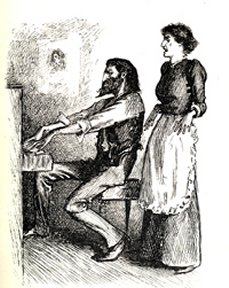 The problem is that Trilby canít put two notes together nor can she even
find the note while finding the key is bothersome. Much is made of
her inability to sing as she screeches ludicrously through Sweet Alice,
Ben
Bolt. (Ben
Bolt was one of the most popular songs of the century on both sides
of the Atlantic. Due to the wonders of the internet if youíve never
heard Ben Bolt you can get a good performance on the net. Iíd heard
of the song but never heard it until I checked it out on the net.
Just amazing.)
The problem is that Trilby canít put two notes together nor can she even
find the note while finding the key is bothersome. Much is made of
her inability to sing as she screeches ludicrously through Sweet Alice,
Ben
Bolt. (Ben
Bolt was one of the most popular songs of the century on both sides
of the Atlantic. Due to the wonders of the internet if youíve never
heard Ben Bolt you can get a good performance on the net. Iíd heard
of the song but never heard it until I checked it out on the net.
Just amazing.)
Her rendition
was a cause of great merriment. So you have the European sketching
the foundation of the girl while the Jew is inspecting the intellectual
possibilities. The Jew will win because heís at the right end.
As I say the mystery of these images float over my head. Iím merely
making a stab at the meaning. I know thereís a contest and what itís
about but the symbolism is shaky to me.
And so the introduction
ends with everyone agreeing that Svengali is a cad after he left and all
three musketeers falling in love with Trilby.
There is much
description of the fine times the musketeers have. One gets the impression
that Du Maurier was living the life in the sixties in Paris but such was
not the case. He signed on at Punch in 1860 and thus was working
as an illustrator for them from that date until his death. He seems
to have been familiar with the Pre-Raphaelite painters of London of whom
he speaks highly most especially of Millais.
He seems to have been friends with a Fred Walker, who he thought was a
great artist but who seems to have been lost in the mists of time.
Iíd never heard of him anyway but one can find his pictures on the internet.
Du Maurier loved the artistís life.
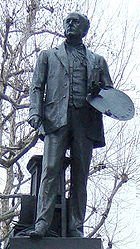 Much of this book as well as the other is a loving recreation of the times
and his memory of the times is one of wonderful things. Very refreshing
against the unremitting negativity of modern literature. The book
is set mainly in the sixties but the Ďhorribleí year of 1871 and the French
Commune obtrudes. Du Maurier, while recognizing its ugliness, nevertheless
passes over it quickly with a shrug and back to the good times. He
introduces some additional charming characters but then comes the crisis.
Much of this book as well as the other is a loving recreation of the times
and his memory of the times is one of wonderful things. Very refreshing
against the unremitting negativity of modern literature. The book
is set mainly in the sixties but the Ďhorribleí year of 1871 and the French
Commune obtrudes. Du Maurier, while recognizing its ugliness, nevertheless
passes over it quickly with a shrug and back to the good times. He
introduces some additional charming characters but then comes the crisis.
Billy had asked
the declassed Trilby to marry him nineteen times and she had always refused
because she knew she wasnít in his class. After an amazingly wonderful
Christmas feast in the atelier Billy asks again. Trilby, as she says,
in a moment of weakness accepts. When the news reaches Billyís mother,
Mrs. Bagot, she scurries over to Paris from London to check Trilby out.
When she learns that Trilby had posed in the altogether she persuades Trilby
to give up her son.
Trilby leaves
town without a goodbye. When Billy finds out he has his brain fever
or a nervous breakdown that prostrates him for weeks. There was a
chance he wouldnít make it. He does but with psychological consequences.
He can no longer love while he lives in a deep melancholia. There
are some who know where thatís at. After he recovers he returns to
England. the wonderful Bohemian rhapsody is over.
Trilby had left
Paris to go to the provinces. She had a little brother who she was
supporting and bringing up who she took with her and who then dies of a
fever. This devastates Trilby who cuts her hair, dresses as a man
and walks back to Paris. Her old haunts have disappeared in the interim
so she shows up on the doorstep of Svengali who is but too happy to take
her in. The hypnotized Trilby is a small part of the book.
The next hundred pages or so describe Billyís wonderful success as a painter
and the loss of camaraderie as the young idealists of the Latin Quarter
age and lose their affinity for each other. Charmingly told with
just the right touch of heartache.
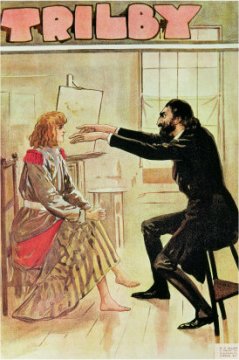 In the meantime and off stage, as it were, Svengali accompanied by Gecko
keeps Trilby in a hypnotic trance as he teaches her to use her tremendous
oral cavity to sing. While she has the exact equipment to be a great
singer she lacks the musical sense and canít learn it sober. Svengali
instills the musical sense through hypnosis but as Gecko later explains
Trilby is merely providing the instrument while Svengali is actually singing
through her. For three years they labor in the salt mines, as they
say, performing on street corners or wherever. Then Trilby is properly
trained becoming the rage of Europe as La Svengali becoming bigger and
better than such stars as Adelina Patti or Jenny Lind, two real life divas.
In the meantime and off stage, as it were, Svengali accompanied by Gecko
keeps Trilby in a hypnotic trance as he teaches her to use her tremendous
oral cavity to sing. While she has the exact equipment to be a great
singer she lacks the musical sense and canít learn it sober. Svengali
instills the musical sense through hypnosis but as Gecko later explains
Trilby is merely providing the instrument while Svengali is actually singing
through her. For three years they labor in the salt mines, as they
say, performing on street corners or wherever. Then Trilby is properly
trained becoming the rage of Europe as La Svengali becoming bigger and
better than such stars as Adelina Patti or Jenny Lind, two real life divas.
Thus while Billy
has lost Trilbyís foot or body, Svengali has captured her soul or oral
cavity. Thatís about the only way I can make sense of foot and cavity.
Now, in real terms
the Jews had been emancipated beginning in 1789 by the French Revolution
although occuring at different localities in Europe at different times.
With the emanicipation a contest began for the soil and soul of Europe.
Europeans owned the soil but the Jews while originating nothing became
the cultural virtuosi of Europe. Not only in the performing arts
but in finance, science and as entrepreneurs. The soil temporarily
remained European but the culture was becoming Judaized. It was then
that Freud made his assault on European concepts of morality. So
Du Maurier has portrayed the situation poetically in a magnificent manner.
Thus the Jews
while offering no Beethovens, Bachs or Mozarts, became virtuoso interpreters
of the music as performers. As Svengali says: Piff, what is
the composition compared to my ability to render it. There you have
the exploiterís motto. The Allen Kleins and Albert Grossmans of the
world suck the talent, as it were, out of their performers or, boys, as
they call them, as agents taking nearly everything leaving the actual talent
a pittance.
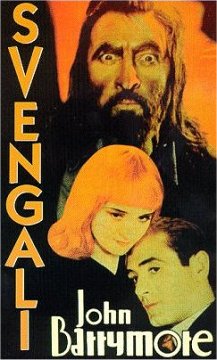 Nothing changes, this is what Svengali was doing with Trilby or, in another
word, Europe. He was making a fortune while Trilby in her hypnotized
state was wasting away. Oh, Svengali dressed her well but for the
sake of his appearance not hers. When she died, of the fortune
that she had made for Svengali none was left to her. Except for presents
she had received in appreaciation of her singing she had nothing.
They were supposed to be man and wife but, in fact, Svengali never married
her. Here I think we have the real import of the story; the competition
for Europe between the Jew and the European. Having given up the
soul of Europe Europeans were losing their very substanc, the soil, or
Trilbyís foot.
Nothing changes, this is what Svengali was doing with Trilby or, in another
word, Europe. He was making a fortune while Trilby in her hypnotized
state was wasting away. Oh, Svengali dressed her well but for the
sake of his appearance not hers. When she died, of the fortune
that she had made for Svengali none was left to her. Except for presents
she had received in appreaciation of her singing she had nothing.
They were supposed to be man and wife but, in fact, Svengali never married
her. Here I think we have the real import of the story; the competition
for Europe between the Jew and the European. Having given up the
soul of Europe Europeans were losing their very substanc, the soil, or
Trilbyís foot.
Du Maurier is
also describing the rise of the artist from a despised menial to the central
position in society that they have attained today, especially movie, TV
and musical stars. One only has to look at the position Bob Dylan
has attained to see the result today. Here is a man with no qualities
revered as if he was the savior while poised to begin a tour of stadiums
at 67.50 a head that will sell out earning him a fortune within a couple
months. Thus as with Svengali he has conquered the soul and wealth
of virtually the world. This is truly astonishing.
So Svengali is
on top of the world. Despised as a beteljew in the atelier a short
five years ago he now has Trilby/Europe and the fortune that goes with
her. Alas, he is sucking the lifeís blood from her to do this and
she is within weeks of death when the Three Musketeers hearing of La Svengaliís
fame travel back to Paris to see her perform.
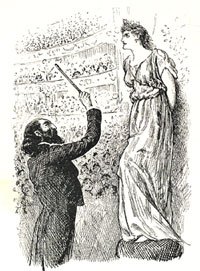 Of course they are so astonished at seeing someone who looks like Trilby
singing that they canít believe it is indeed her. Svengali harbors
ill will toward Billy because Billy is always in her heart while her relationship
with Svengali is strictly professional.
Of course they are so astonished at seeing someone who looks like Trilby
singing that they canít believe it is indeed her. Svengali harbors
ill will toward Billy because Billy is always in her heart while her relationship
with Svengali is strictly professional.
The Musketeers
and the Svengalis are staying at the same hotel where Svengali meeting
Billy canít resist spitting in his face. Billy, who is actually known
in the story as Little Billee is much smaller than the six foot Svengali
but he nevertheless goes after him getting the worst of the fight until
Taffy, a giant body builder type, shows up grabbing Svengaliís Ďhuge Hebrew
noseí between his first two fingers leading him around by the nose.
Oh, those unintended consequences. The humiliation is too much for
Svengali, he becomes vicious toward Trilby in revenge. Readying for
their London debut he bullies Trilby in front of Gecko, now his first violinist,
who stabs Svengali in the neck with a small knife.
Svengali while
wounded is not hurt that bad but his physicians advise him not to conduct
the opening performance. This creates a problem because Svengali
must make eye contact to sing through Trilby.
He takes a box
directly in front of Trilby. But he spots Billy and the other two
musketeers in the pit in front of him. The malice and venom he has
toward Billy makes his heart fail. His face freezes into a risus
sardonicus as he sits lifelessly leering at the Three Musketeers, triumphant
in death. Of course Trilby canít sing a note on her own so that ends
a fine career. Now begins the denouement. While seemingly superfluous
this is a very important part of the story giving it its secondary meaning.
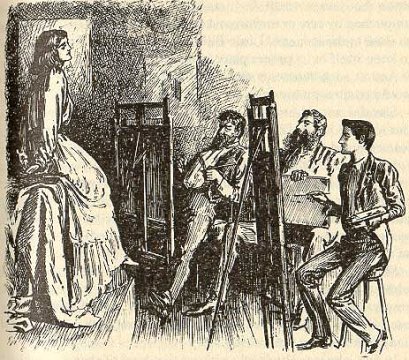 The Musketeers take Trilby in charge. No one is aware she had been
hypnotized while she has no memory of performing and little of the lost
five years. The situation between she and Mrs. Bagot, Billyís mother,
are now reversed. Trilby is the great lady while Mrs. Bagot is merely
a middle class hausfrau. One might say Svengali has created the real
Trilby. Mrs. Bagot still hadnít posed in the altogether however.
Where was Hugh Heffner when you needed him.
The Musketeers take Trilby in charge. No one is aware she had been
hypnotized while she has no memory of performing and little of the lost
five years. The situation between she and Mrs. Bagot, Billyís mother,
are now reversed. Trilby is the great lady while Mrs. Bagot is merely
a middle class hausfrau. One might say Svengali has created the real
Trilby. Mrs. Bagot still hadnít posed in the altogether however.
Where was Hugh Heffner when you needed him.
On the surface
it looks as though Mrs. Bagot has gotten her comeuppance but as Trilby
is the creation of Svengali she would have remained the simple little grisette
that Billy loved without him. She would have remained the foot without
realizing the potential of her oral cavity. Nevertheless this Trilby
was Trilby as she should have been.
The woman was
fading fast. Svengali had drawn the vital energy from her in his
exploitation of her. Mysteriously, just before she dies, a life sized
portrait of Svengali is delivered. The contest between he and Billy
is still in effect. Gazing in the painted eyes of the hypnotist Trilby
breaks into song as a final effort in her best manner.
Billy is grasping
desperately for Trilbyís love. On her death bed he leans close to
hear her breathe out - Svengali, Svengali, Svengali. Thus
he believes she loved Svengali more than he. His brain fever is reactivated,
he dies. In grand operatic style the love story ends. All because
Mrs. Bagot was a snob. But, I think a correct one. Although,
what the heck, Billy was just a boho painter.
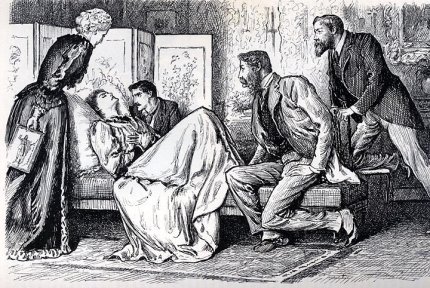
As an anti-climax
in a final chapter titled "Twenty Year After" as tribute to Dumas whose
sequel to The Three Musketeers was title Twenty Years After,
Taffy takes a trip to Paris where he finds Gecko playing fiddle in a music
hall. He sends a note that Gecko accepts requesting a meeting at
his hotel. There Gecko resolves the mystery filling Taffy in on Trilbyís
missing five years. He reveals that Trilby had always loved Little
Billee and never Svengali.
The reading public
then and now has concentrated on the Svengali-Trilby hypnotism aspect of
the novel ignoring the rest. That aspect is actually a very small
part of the novel but without it I suppose the story woud have fallen flat.
Even today a manager like Colonel Tom Parker is thought of as a Svengali
to Elvis Presley, so the name has come into common usage for someoneís
inexplicable control of someone else.
Edgar Rice Burroughs
who had a fascination with hypnotism was probably charmed by that aspect
of the story. In his most detailed reference to hypnotism in Thuvia,
Maid Of Mars he seems most influenced by stage hypnotism in which
the audience is induced to see what is not there rather than the Svengali
type. Still, Thuvia-Trilby and the relationship between Jav and Thuvia
and Thuvia and Tario has some resonances. I dout that ERB would have
been conscious of his borrowing imagining rather that he was creating
the story from whole cloth.
End of Part Two, Go to
Part Three the Review of The Martian.
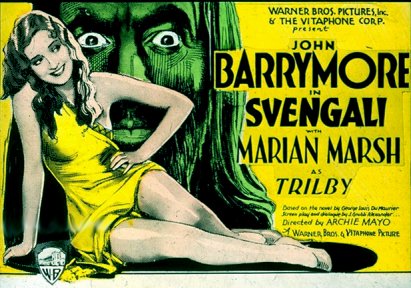
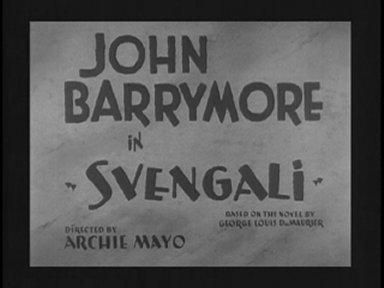
"Svengali" (1931) is a drama/horror film starring John Barrymore,
Marian Marsh, and Bramwell Fletcher, directed by Archie Mayo, written by
J. Grubb Alexander, and released by Warner Brothers. It is based on the
gothic horror novel "Trilby" (1894) by George du Maurier. The film was
originally released on May 22, 1931. Warner Brothers was so pleased by
the box office on this film that the studio hurriedly reteamed Barrymore
and Marsh for another horror film "The Mad Genius", released on November
7, 1931.
Plot
The ending of the novel is changed in this film to a highly dramatic
and uncompromising one by having Trilby die at Svengali's hands after he
is stricken with a fatal heart attack, instead of dying of a mysterious
illness a few days later. She faints after he collapses in the stage box,
but Svengali revives long enough to gasp, "God grant me the one thing in
death that I could not have in life". She then dies, followed by the vengeful
Svengali. In the film Billee survives.
Edmund Clarence Stedman, ed. (1833Ė1908). An American Anthology,
1787Ė1900. 1900.
Ben Bolt
By Thomas Dunn English
Don't you remember sweet Alice, Ben Bolt,ó
Sweet Alice whose hair was so brown,
Who wept with delight when you gave her a smile,
And trembled with fear at your frown?
In the old church-yard in the valley, Ben Bolt,
5
In a corner obscure and alone,
They have fitted a slab of the granite so gray,
And Alice lies under the stone.
Under the hickory tree, Ben Bolt,
Which stood at the foot of the hill,
10
Together we íve lain in the noonday shade,
And listened to Appletonís mill.
The mill-wheel has fallen to pieces, Ben Bolt,
The rafters have tumbled in,
And a quiet which crawls round the walls as you gaze
15
Has followed the olden din.
Do you mind of the cabin of logs, Ben Bolt,
At the edge of the pathless wood,
And the button-ball tree with its motley limbs,
Which nigh by the doorstep stood?
20
The cabin to ruin has gone, Ben Bolt,
The tree you would seek for in vain;
And where once the lords of the forest waved
Are grass and the golden grain.
And donít you remember the school, Ben Bolt,
25
With the master so cruel and grim,
And the shaded nook in the running brook
Where the children went to swim?
Grass grows on the masterís grave, Ben Bolt,
The spring of the brook is dry,
30
And of all the boys who were schoolmates then
There are only you and I.
There is change in the things I loved, Ben Bolt,
They have changed from the old to the new;
But I feel in the deeps of my spirit the truth,
35
There never was change in you.
Twelvemonths twenty have past, Ben Bolt,
Since first we were friendsóyet I hail
Your presence a blessing, your friendship a truth,
Ben Bolt of the salt-sea gale.

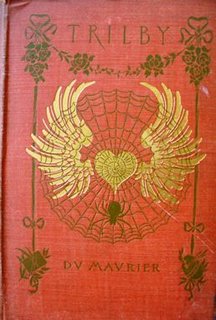
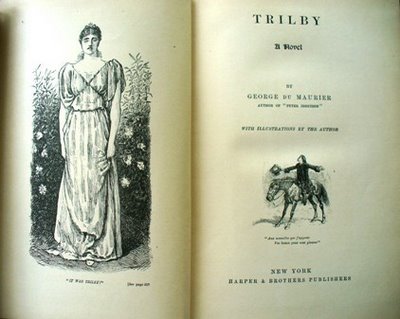
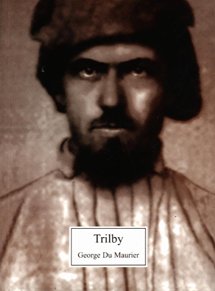
 Du Maurier is interesting as a possible influence on Burroughs. Du
Maurier not only borrows from authors he admires but tells the reader he's
borrowing. Burroughs borrows without creditation. The great
literature of the nineteenth century was written during Du Maurierís lifetime.
Thus Alexandre Dumas' Three Musketeers of 1845 was a new book.
It was also a book that overwhelmed Du Maurier's imagination,while having
a later profound effect on Burroughs. Thus Du Maurier tells the reader
his plot is based on The Three Musketeers. Like Burroughs
Du Maurier incorporates several sources in an obvious manner. He
was apparently fascinated by Henry Murgerís Scenes De La Vie Boheme of
1851. I havenít read the book as yet but other reviewers say the
influence is there. I pick up an influence from La Dame Aux Camellias
by Dumas fils also. Du Maurier refers to many poets and writers whose
writing left him helpless but as I am not that well grounded in many aspects
of early nineteenth century literature I canít identify the influences
myself but they are as plentiful and obvious as with Burroughs himself.
Du Maurier is interesting as a possible influence on Burroughs. Du
Maurier not only borrows from authors he admires but tells the reader he's
borrowing. Burroughs borrows without creditation. The great
literature of the nineteenth century was written during Du Maurierís lifetime.
Thus Alexandre Dumas' Three Musketeers of 1845 was a new book.
It was also a book that overwhelmed Du Maurier's imagination,while having
a later profound effect on Burroughs. Thus Du Maurier tells the reader
his plot is based on The Three Musketeers. Like Burroughs
Du Maurier incorporates several sources in an obvious manner. He
was apparently fascinated by Henry Murgerís Scenes De La Vie Boheme of
1851. I havenít read the book as yet but other reviewers say the
influence is there. I pick up an influence from La Dame Aux Camellias
by Dumas fils also. Du Maurier refers to many poets and writers whose
writing left him helpless but as I am not that well grounded in many aspects
of early nineteenth century literature I canít identify the influences
myself but they are as plentiful and obvious as with Burroughs himself.
 After Trilby arrives come Svengali and his sidekick Gecko. They are
musicians. Svengali is billed as an incomparable musician which is
to say performer. He was a great pianist. He taught Gecko his
violinist everything he knew.
After Trilby arrives come Svengali and his sidekick Gecko. They are
musicians. Svengali is billed as an incomparable musician which is
to say performer. He was a great pianist. He taught Gecko his
violinist everything he knew.
 The problem is that Trilby canít put two notes together nor can she even
find the note while finding the key is bothersome. Much is made of
her inability to sing as she screeches ludicrously through Sweet Alice,
The problem is that Trilby canít put two notes together nor can she even
find the note while finding the key is bothersome. Much is made of
her inability to sing as she screeches ludicrously through Sweet Alice,
 Much of this book as well as the other is a loving recreation of the times
and his memory of the times is one of wonderful things. Very refreshing
against the unremitting negativity of modern literature. The book
is set mainly in the sixties but the Ďhorribleí year of 1871 and the French
Commune obtrudes. Du Maurier, while recognizing its ugliness, nevertheless
passes over it quickly with a shrug and back to the good times. He
introduces some additional charming characters but then comes the crisis.
Much of this book as well as the other is a loving recreation of the times
and his memory of the times is one of wonderful things. Very refreshing
against the unremitting negativity of modern literature. The book
is set mainly in the sixties but the Ďhorribleí year of 1871 and the French
Commune obtrudes. Du Maurier, while recognizing its ugliness, nevertheless
passes over it quickly with a shrug and back to the good times. He
introduces some additional charming characters but then comes the crisis.
 In the meantime and off stage, as it were, Svengali accompanied by Gecko
keeps Trilby in a hypnotic trance as he teaches her to use her tremendous
oral cavity to sing. While she has the exact equipment to be a great
singer she lacks the musical sense and canít learn it sober. Svengali
instills the musical sense through hypnosis but as Gecko later explains
Trilby is merely providing the instrument while Svengali is actually singing
through her. For three years they labor in the salt mines, as they
say, performing on street corners or wherever. Then Trilby is properly
trained becoming the rage of Europe as La Svengali becoming bigger and
better than such stars as Adelina Patti or Jenny Lind, two real life divas.
In the meantime and off stage, as it were, Svengali accompanied by Gecko
keeps Trilby in a hypnotic trance as he teaches her to use her tremendous
oral cavity to sing. While she has the exact equipment to be a great
singer she lacks the musical sense and canít learn it sober. Svengali
instills the musical sense through hypnosis but as Gecko later explains
Trilby is merely providing the instrument while Svengali is actually singing
through her. For three years they labor in the salt mines, as they
say, performing on street corners or wherever. Then Trilby is properly
trained becoming the rage of Europe as La Svengali becoming bigger and
better than such stars as Adelina Patti or Jenny Lind, two real life divas.
 Nothing changes, this is what Svengali was doing with Trilby or, in another
word, Europe. He was making a fortune while Trilby in her hypnotized
state was wasting away. Oh, Svengali dressed her well but for the
sake of his appearance not hers. When she died, of the fortune
that she had made for Svengali none was left to her. Except for presents
she had received in appreaciation of her singing she had nothing.
They were supposed to be man and wife but, in fact, Svengali never married
her. Here I think we have the real import of the story; the competition
for Europe between the Jew and the European. Having given up the
soul of Europe Europeans were losing their very substanc, the soil, or
Trilbyís foot.
Nothing changes, this is what Svengali was doing with Trilby or, in another
word, Europe. He was making a fortune while Trilby in her hypnotized
state was wasting away. Oh, Svengali dressed her well but for the
sake of his appearance not hers. When she died, of the fortune
that she had made for Svengali none was left to her. Except for presents
she had received in appreaciation of her singing she had nothing.
They were supposed to be man and wife but, in fact, Svengali never married
her. Here I think we have the real import of the story; the competition
for Europe between the Jew and the European. Having given up the
soul of Europe Europeans were losing their very substanc, the soil, or
Trilbyís foot.
 Of course they are so astonished at seeing someone who looks like Trilby
singing that they canít believe it is indeed her. Svengali harbors
ill will toward Billy because Billy is always in her heart while her relationship
with Svengali is strictly professional.
Of course they are so astonished at seeing someone who looks like Trilby
singing that they canít believe it is indeed her. Svengali harbors
ill will toward Billy because Billy is always in her heart while her relationship
with Svengali is strictly professional.
 The Musketeers take Trilby in charge. No one is aware she had been
hypnotized while she has no memory of performing and little of the lost
five years. The situation between she and Mrs. Bagot, Billyís mother,
are now reversed. Trilby is the great lady while Mrs. Bagot is merely
a middle class hausfrau. One might say Svengali has created the real
Trilby. Mrs. Bagot still hadnít posed in the altogether however.
Where was Hugh Heffner when you needed him.
The Musketeers take Trilby in charge. No one is aware she had been
hypnotized while she has no memory of performing and little of the lost
five years. The situation between she and Mrs. Bagot, Billyís mother,
are now reversed. Trilby is the great lady while Mrs. Bagot is merely
a middle class hausfrau. One might say Svengali has created the real
Trilby. Mrs. Bagot still hadnít posed in the altogether however.
Where was Hugh Heffner when you needed him.
















